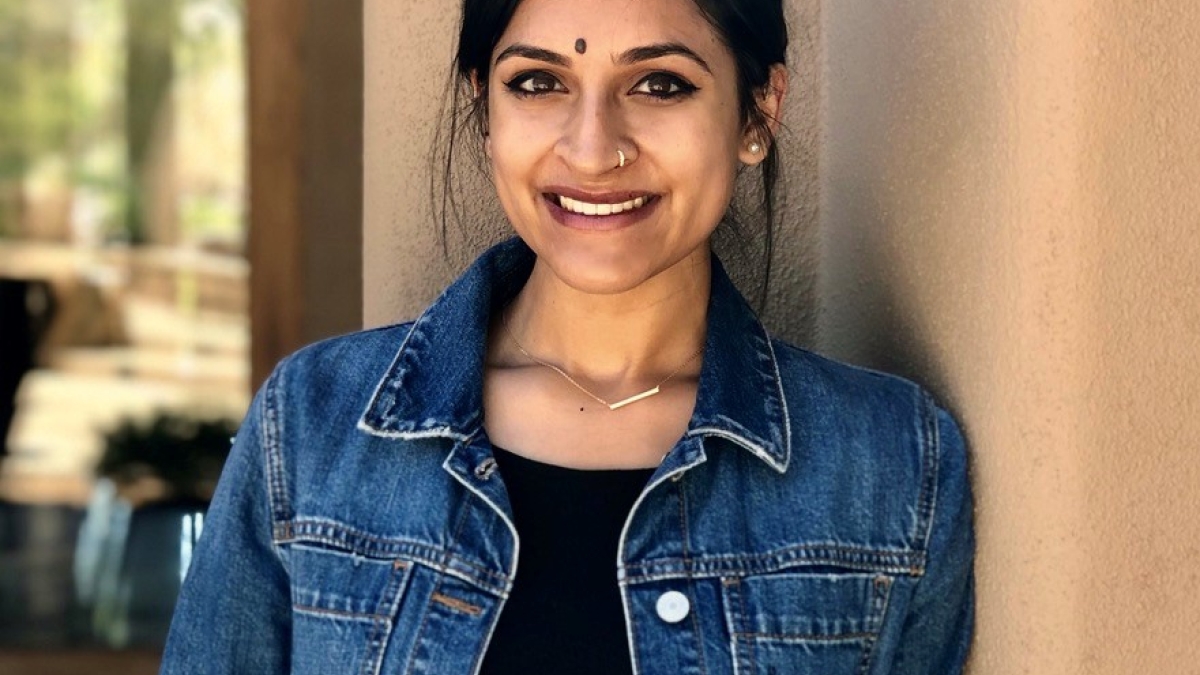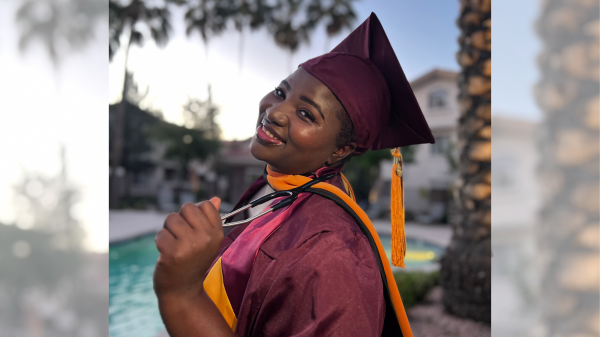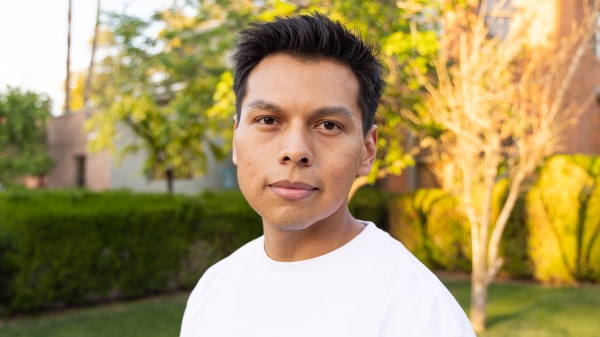ASU graduate Asha Ramakumar plans career in law and public health policy

Asha Ramakumar will be attending the George Washington University Law School in Washington, D.C., to pursue a joint Juris Doctorate and Master of Public Health.
Editor's note: This story is part of a series of profiles of notable spring 2020 graduates.
Asha Ramakumar is not afraid to talk about a topic a lot of people think is taboo. As a matter of fact, she believes talking about menstruation is necessary to promote health equity and destigmatize a natural occurrence.
Ramakumar felt so strongly about it that she spoke on her own very personal experience in March 2019 at Ignite, Arizona State University’s semiannual storytelling event.
“I wanted to talk about global women’s health in some capacity. My student organization, Global Women’s Health Initiative, was focused on menstrual equity that semester, so I settled on that as my topic,” said Ramakumar, who is receiving a bachelor’s degree in global politics with a minor in women and gender studies and a certificate in health care policy and delivery, with honors from Barrett, The Honors College.
She opened her monologue with a story about her first period, including a pantomime of what happened when she forgot her menstrual hygiene products.
“I explained that when I was in middle school, I desperately wanted my period because it made me feel connected to something larger than myself. Almost like a secret community,” Ramakumar said.
“Speaking about this was an act of resistance, especially since my grandfather believes that women are impure during menstruation. This experience was so empowering for me that it made me realize how important it is to let people share their stories so others can listen. I think it’s the best way to foster empathy,” she added.
Ramakumar, who was a New American University Presidential Scholar, on the W. P. Carey School of Business Dean's List, a United Nations Millennium Fellow in fall 2018 and a Lincoln-Chautauqua Fellow in 2019, plans to work in the fields of law and public health policy.
She will be attending the George Washington University Law School in Washington, D.C., to pursue a joint Juris Doctorate and Master of Public Health.
We asked her to reflect on her undergraduate experience at ASU. Here’s what she had to say.
Question: What was your “aha” moment, when you realized you wanted to study the field you majored in?
Answer: I think I have had several different “aha” moments. The first was in high school when I took Law and Policy, a second-semester complement to my school’s AP Government curriculum. My teacher assigned each of us a docket of Supreme Court cases, and she gave me cases centered around women’s and LGBTQ+ rights such as Griswold v. Connecticut, Lawrence v. Texas, and of course, Roe v. Wade. After reading these cases, I began to see how the largest sources of inequity seem to happen around regulating people’s bodies, especially gender-specific inequity. I was simultaneously shadowing an OB-GYN for my senior internship, and I think these two experiences shaped my specific interest in women’s health. I realized that working on an individual-patient provider level was not where my skills were best served.
This was narrowed further throughout my coursework at ASU both through my minor in gender studies and my certificate in health care policy. After taking classes centered around gender, religion, health disparities, violence and colonialism, I began to see how all of these areas of study are interrelated. From this, I realized that to address health care access or lack thereof, I need to have an understanding of the many systems in place that impact health. In other words, people are not independent of their environment, circumstances, or identity, therefore, neither is their health.
Q: What’s something you learned while at ASU — in the classroom or otherwise — that surprised you or changed your perspective?
A: This semester, I was enrolled in the Inside-Out Prison Exchange Program through Barrett. The class, titled “Men and Feminism”, piqued my interest as a gender studies minor.
Looking back, I am not quite sure what I had expected from this class. I knew we were going to be reading things by bell hooks (the pen name for author, feminist and social activist Gloria Jean Watkins) and other works on masculinity and violence, but I did not know how much the other students in the class would challenge me.
Unlike other honors classes, this class took place at the Maricopa Men’s Reentry Center. Every Monday and Wednesday from 6 to 9 p.m., we met in a classroom in the facility with a group of “inside” students. This course was only Session A, but I wish it were longer, especially since saying goodbye was gut-wrenching.
In each class, we used the texts to guide our discussion, but the topics were so deeply personal that it often changed to becoming a time to talk about our lived experiences. One moment, in particular, stands out to me.
We were reading bell hooks’ "Feminism is For Everybody," and one inside student looked particularly frustrated. He proceeded to explain that bell hooks asks that parents explain feminism to their children and teach them how to challenge patriarchy, particularly through nonviolence, however, this is not practical for him. The inside student proceeded to ask the class if he should teach his son not to fight back against bullies and explained that violence is a necessary means of survival in his community. Several other inside students also explained that challenging patriarchy is great in theory but almost impossible in their communities.
This experience forced me to take a step back from my preconceived ideas of feminism and patriarchy and understand that it is a luxury to adopt feminist ideology and to challenge norms. It made me think critically about how the intent of a given policy or theory may be great, but the impact is what is important.
Q: Why did you choose ASU?
A: For me, ASU was kind of a no-brainer. I have always known that I wanted to go to graduate school, so when I was looking for undergraduate programs, I wanted one that would give me the widest breadth of opportunities and the most supportive living situation. I felt like Barrett gave me the living situation and the close-knit community that I wanted while the greater ASU has unlimited opportunities. I have been able to travel, take graduate classes and attend some cool events because of that!
Q: Which professor taught you the most important lesson while at ASU?
A: Professor Swapna Reddy in the College of Health Solutions has been an incredible mentor to me in so many ways. I think the most important lesson she taught me is to be courageous and to trust my abilities. There were quite a few times where people told me I was going to be unable to achieve and/or do something, but Professor Reddy always stood by me and made me feel like those barriers were invisible. My relationship with her taught me how important it is to have at least one faculty member who can advocate for you or give you the tools to advocate for yourself.
Q: What’s the best piece of advice you’d give to those still in school?
A: Be curious. The best things I did in college were honestly because I was just curious and went to check it out. It’s sometimes daunting to attend an event or enroll in a class that is outside your comfort zone, but sometimes that’s how you find what clicks with you. That being said, you shouldn’t force yourself to like or do something that feels wrong. However, the more you explore, the more you’ll know when something feels right.
Q: What was your favorite spot on campus, whether for studying, meeting friends, or just thinking about life?
A: I am a very antsy person, so I always needed to find a new place to work to avoid feeling bored. That being said, I love the Design Library. I lived on the north side of campus, so that location felt well-connected to a lot of other resources. I love libraries, and the Design Library reading room is the closest thing we have to that old-style library. Plus, you get to see some pretty cool work from the Herberger Institute for Design and the Arts students, which is a plus.
Q: If someone gave you $40 million to solve one problem on our planet, what would you tackle?
A: Oh goodness ... I think addressing social determinants of health would be where that money should go. I know, that’s a pretty broad place to start, but I think investing in environmental policies that provide clean air, water and living conditions is critical. In addition to this, it would also mean addressing education and creating robust social policies that ultimately create a healthier population. I think if this moment in time has taught us anything, it is how fragile the entire system is, and I think a lot of that is predicated on the lack of strong public health infrastructure.
More Sun Devil community

A big move leads to even bigger opportunity for ASU grad
Moving, no matter the distance, can be a big undertaking — but moving to another country? That's life changing. Bilha Obaigwa…

Students amped for Devilpalooza 2024 just around the corner
The thrill of live music coursing through your body. Crowds of Sun Devils dancing the night away in a jam-packed arena. Electric…

Dean's Medalist embraces heritage language through poetry
Editor’s note: This story is part of a series of profiles of notable spring 2024 graduates. When he first enrolled at Arizona…